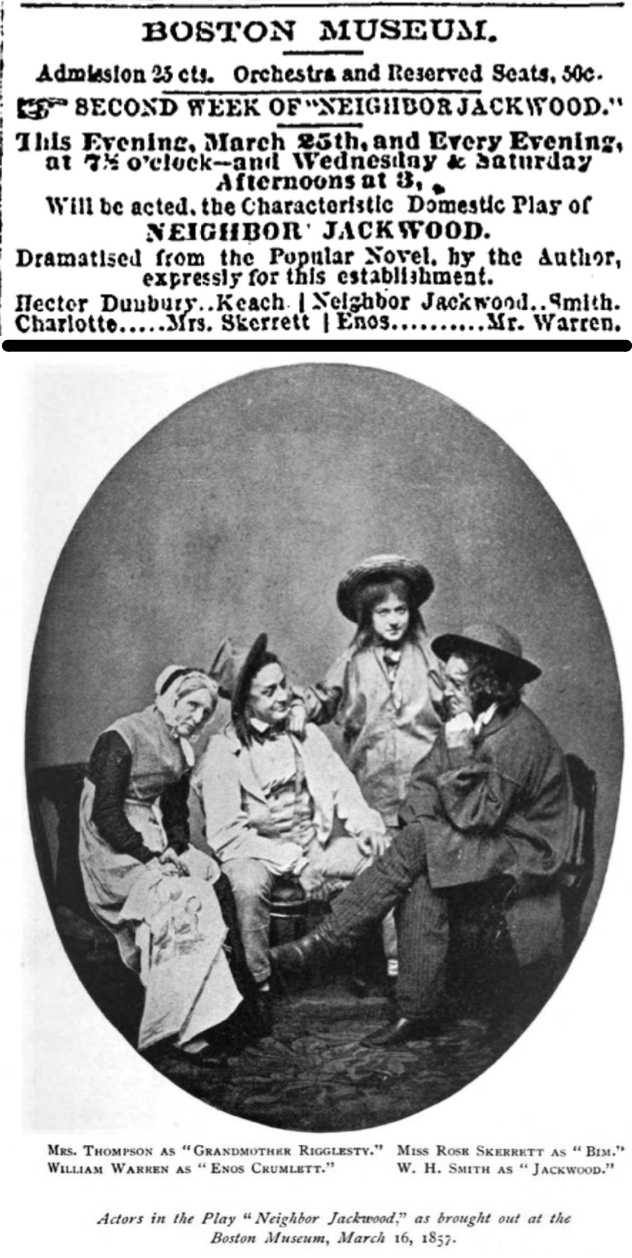[Mary Ann] Brackett, Mrs. Clement and self went to the museum -- saw "Jackwood".![]() Miss B. took tea and spent the eve.
Miss B. took tea and spent the eve.
Thurs.
I rode over and invited Mrs. C. Stearnes to dine, Mrs. Dr. Pierce & Mrs. Fox -- Mrs. Hedge -- only Mrs. C.S. came to dinner.
Frid.
Very lonely. Spent the afternoon making calls. Rachel C. who is not well enough to keep school this week -- Called on Mrs. Edmond -- Crafts -- & Candler.
Sat.
Sewed -- a good deal after sweeping & dusting chambers. Reading Aurora Leigh -- blank verse.![]() Sent a letter to Susan.
Sent a letter to Susan.
Sund. 29th
Rev'd. Hill preached.![]() I went in the afternoon. Walked home. Spent an hour with Rachel
I went in the afternoon. Walked home. Spent an hour with Rachel
Mond. 30th
Rec'd. a letter from Charly W. Califor. A slight flurry of snow.
April 1st, Wednes. 1857
Reading Neighbor Jackwood lent to me by Miss Brackett. We agreed to go to the afternoon concert Wed. 8th but the Dr. being in one of his undecided moods, asked me to ride in with him then delayed too late for me, so I went to Sullivans, got Ellen's letter and saw the curiosities -- then came out in omnibus.
(Thurs. 9th
I called for machine -- 15$ -- for L. could not have it [hiss????])
Sund. 5th
Rode with Dr. -- stopped twice, but it grew so cold thought best to wait for him at E. Atkinsons. He was delayed by going to Twitchels twice and it was 11 o'clock when I got home.
Mond. & Tues.
Housework, sewing, reading. Unpleasant weather.
Thurs. 9th
Walked from the machine to Whipples where Dr. called for me, and we sat for our likenesses. Took out 4 of Dr.'s two of mine.
Frid.
Wrote to L. Had already written to Charly 5th
5th Sund.
Mr. Wood spent night at Candlers & did not call here. Mr. Hedge. Dr. went up [with?] me, but kept on to his work.
Mond. 13th
I went out in the garden to get roots for Laura & pack a box of beg. I took a violent cold. Miss Homans dined here, & then went to Mr. Edmonds. Mr. Phipps came in the eve., wanted some money to invest in [Ireland? Iceland?]. Staid the night. Dr. took him in to city next morning, cold, pouring rain [ditto?].
Wednes.
Not pleasant. Miss Bracket called. I was too unwell to go in to the concert. She went to the city.
Thurs. 16th
Fast day. Sun out. No services at our church.
Frid.
I felt better of my cold -- and finished the waist of plain gray delaine which I begun in winter.
Sat. 18th
The sun shone out some, but for ten days we have had it N.E. or S.E. and cold. Some snow & hail. I went to Boston with Mike put letters in the office for Mr. Phipps and left Kate King's letter to her, rode to Brighton for ox gall![]() -- for Dr. I took a chill. It was [east?] & near night. This morning a nose bleed & headache. Dr. left me at church, then called for me, but the weather kept me in the house in the afternoon. In the eve. Miss Cushing & John Candler called. He had seen Mary & Ed and she sent word about Mrs. John Pitman. Last week I received private letter from Sue about G.A.W. vis. East. Trouble between Dr. & him.
-- for Dr. I took a chill. It was [east?] & near night. This morning a nose bleed & headache. Dr. left me at church, then called for me, but the weather kept me in the house in the afternoon. In the eve. Miss Cushing & John Candler called. He had seen Mary & Ed and she sent word about Mrs. John Pitman. Last week I received private letter from Sue about G.A.W. vis. East. Trouble between Dr. & him.
Sund. eve. 19th April

Neighbor Jackwood was an adaptation for the stage by J.T. Trowbridge of his anti-slavery novel of the same name.
The story is centered around a young woman rescued from slavery and brought to a small town in Vermont where she passes for white. She falls in love with a young man, arousing the jealousy of the abolitionist who had helped her escape. He, in turn, conspires with slave hunters to send her back to slavery but with the support of the townspeople his efforts are defeated.
The play, in addition to its anti-slavery sentiments, presents a picture of small town life in the antebellum North, much of it played for laughs. It avoids some of the conventions of abolitionist dramas of the era, as described in the Historical Dictionary of American Theater: Beginnings:
Not everyone appreciated the sentiment. A reviewer for one newspaper, while applauding the play, wrote "The ultra abolitionist sentiments, as a matter of course, provoke disapprobation, and a correct taste would suggest their omission." But other disagreed; a letter to one paper lauded the play's anti-slavery sentiments. "The involuntary and unbounded applause, that burst from the assembled multitude at the defeat of the slave hunter," they wrote, "was quite conclusive that a majority held the same opinion."
Aurora Leigh is an epic poem published by Elizabeth Barrett Browning in 1856
This is probably George Hill, Unitarian minister at the time at West Cambridge (now Arlington).
Ox gall, obtained from the gall bladder of cows or oxen, had medicinal uses in homeopathic medicine. Mary went to Brighton to obtain some from the Brighton cattle market for her husband's use in his medical practice.